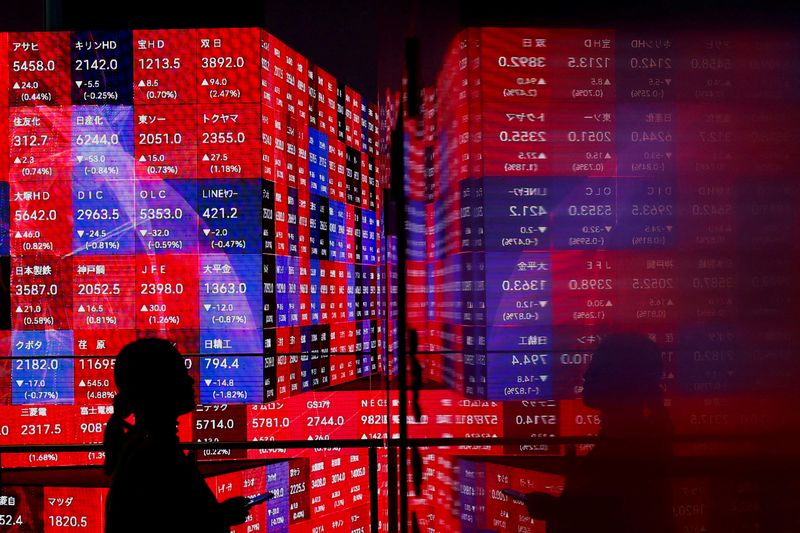By Daniel Leussink and Anton Bridge
TOKYO (Reuters) - For Takashi Karube and many Japanese like him, the Tokyo stock rally has been little to cheer about.
The Nikkei stock index hit its highest ever on Thursday, surpassing a record set in December 1989 and marking a once-unthinkable recovery for a market that spent much of the last three decades mired in malaise.
Rather than the flashy spending and bottomless optimism of the bubble years, the 34-year-old Karube, born just two months after the stock market's 1989 peak, grew up with frugality and constant reminders of Japan's declining economic might.
"My salary hasn't gone up in 10 years," said Karube, who works for an online bank. "People think things are good as long as they can just keep their current standard of living."
Japan slipped into recession at the end of last year, data showed this month, and is no longer the world's No.3 economy, having lost that spot to Germany.
Karube has tried to weather the higher food costs of recent years by shopping at discount supermarkets, bringing his lunch to work and eating out less.
He has been putting money into U.S. and global stock funds for the last seven or eight years, reflecting his pessimistic outlook about Japan.
In many ways, Japan has never escaped the trauma that followed the bubble's crash, when companies went bankrupt, banks imploded and executives even committed suicide.
The recent stock market run - driven by foreign investors as governance reform and a weak yen have made Japanese companies more attractive - has so far failed to dislodge Japan's long pessimism.
"If stocks go up, that doesn't really affect our living standards, and in a lot of ways Japan isn't doing well, the yen's very weak," said 57-year-old Sachio Kuroshima, as she waited for the shinkansen bullet train in Tokyo station.
She said she was considering putting some money into the government's NISA tax-free stock investment programme but hadn't started yet.
HARSH EXPERIENCE
Japan's mom and pop investors have long been wary of their home market due to the "harsh experience or memory from the Nikkei crash more than 30 years ago," said Tohru Sasaki, chief strategist at Fukuoka Financial Group, who previously worked at JPMorgan and the Bank of Japan.
That also helps explain why the millions of Japanese who have NISA stock accounts are largely investing overseas - most analyst estimates show the money has gone primarily into U.S. funds and stocks.
"The Japanese economy is not good at all. The reason why stocks are going up is because foreigners are buying," said 68-year-old Hiroyuki Saito, who ran an event production company before he retired.
Japan was once a country with cutting-edge research in areas such as semiconductors, but no longer, he said.
The biggest companies are set to offer record wage increases again this year, responding to a push by Prime Minister Fumio Kishida for a "virtuous cycle" of higher wages feeding "good" inflation.
But the smaller companies that employ about 70% percent of the workforce have often struggled to raise wages.
'BAD INFLATION'
The outlook for workers in general is not good, said 60-year-old Hajime Sato, who works at a construction firm that employs about 150 staff.
"Nothing is really trickling down," he said.
A weak yen has pushed up the price of food, fuel and other goods - stoking the "bad" inflation the central bank, and Kishida, want to avoid.
A weaker currency was once unequivocally seen as a positive for Japan's export-driven economy. Although it still fattens profits for the likes of Toyota Motor (NYSE:TM), it is less of a benefit than before, as many companies now manufacture overseas.
For 24-year-old Yui Iwatsuki, the excess of the bubble era - and all the designer clothes and handbags - would be unthinkable now.
She used to shop at department stores but now buys cheaper clothes because wages have barely risen at the building management company where she works.
"The way my parents' generation partied was very flashy," she said.
Yet the market rally has been something of a wake-up call for some Japanese.

"I was never really interested in investing in stocks before, but the recent stock market news and NISA have changed my mind," said Koji Yamaguchi, a salaryman in his 30s.
"I now feel the need to be more proactive in investing, especially as everything is getting more expensive and my pay rises aren't keeping pace."